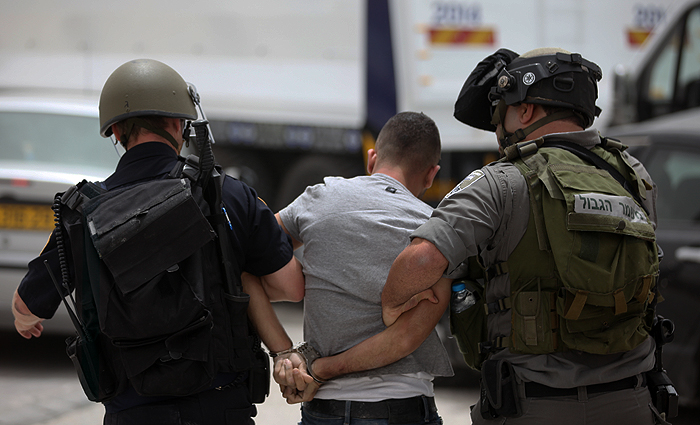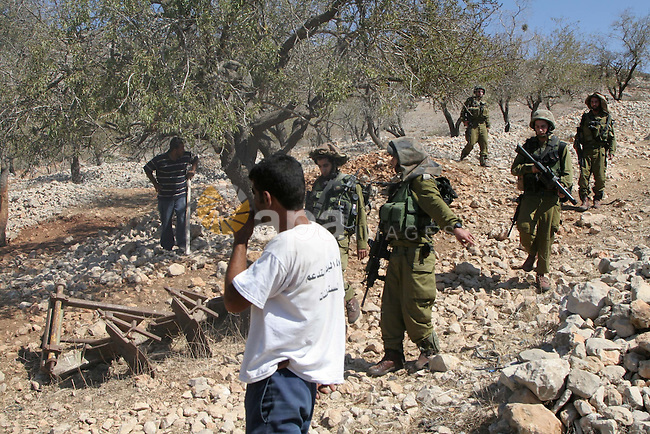During the month of September 2022, the Israeli occupation authorities detained 445 Palestinians across the occupied West Bank and Jerusalem, including 35 children and 19 women.
Detentions in Jerusalem constituted the highest percentage each month that reached 181 cases, including 31 children and minors, and 16 women, followed by Jenin with 59 cases, and Hebron with 55 cases of detentions.
The number of administrative detention orders issued during the month of September reached 245, including 102 new orders and 143 renewal orders.
Last September witnessed a high intensity of violations and crimes committed by the occupation against Palestinian detainees, including field executions, the policy of collective punishment, and the implementation of more organized arrests, which were accompanied by grave violations against detainees and their families.
Human rights institutions indicate that the number of Palestinian prisoners and detainees in the occupation prisons amounted to about 4,700 prisoners, until the end of September 2022, including 30 female prisoners, 190 minors, and 800 administrative detainees. Among them are two female captives, and about 6 children.
The most prominent institutions that document the issues of Palestinian detainees in the Israeli occupation prisons are the Palestinian Detainees and Ex-Detainees Affairs Commission, the Palestinian Prisoner Club, the Addameer Foundation for Prisoner Care and Human Rights, and the Wadi Hilweh Information Center – Jerusalem.
The following highlights a part of the reality of Palestinian detainees held in the occupation prisons, and the most prominent abusive policies and measures implemented by the Israeli occupation against them during the past month.
Palestinian administrative detainee, Khalil Awawda, pays the price for his steadfastness
The Palestinian detainee Khalil Awawda was arrested several times by the Israeli occupation forces, between sentences and administrative detention. He spent a total of 10 years and more in the Israeli occupation prisons, and the last time he was arrested was on December 27, 2021, when an administrative detention order for 6 months was issued against him.
His sentence ends hypothetically on June 26 of this year, but the end of the period does not mean his immediate release after its expiration. The period of administrative detention issued against him, like other administrative detainees, has been extended more than once, and it may be extended in the last hours.
This prompted the detainee Awawda to start an individual hunger strike on March 3, in refusal to continue his administrative detention and to ensure that the period of his detention would not be extended and consequently his release will be on June 26.
He steadily continued his hunger strike for about 111 continuous days, before he ended his strike on June 21, based on an agreement with the Israeli prison administration to not extend his detention, but the prison administration did not abide by what it had agreed upon with Awawda and immediately issued a decision according to which his detention would be extended for new four months.
Awawda went on hunger strike again last July 2, despite the deterioration of his health and his failure to recover as a result of his previous long hunger strike, before he ended it on August 31 based on an official agreement to release him on October 2. Thus, his strike lasted for 172 days.
In the face of this great challenge and insistence, the occupation’s attempts to piss him off and obstruct the process of releasing him did not stop. It delayed his release at first and then refused to release him on the pretext that he had a mobile phone during his transfer from a hospital.
The Israeli prison administration kept him as a prisoner in its prisons awaiting his trial, and not only as an administrative detainee. He is currently in the so-called Ramleh prison hospital, where he suffers from diseases and his health deteriorates.
The Palestinian detainee Khalil Awawda was born on November 13, 1981, in the town of Ithna in Hebron. He is married and has 4 daughters, Tolin, Lauren, Maria, and Mariam.
Administrative detainees fight to end the crime of administrative detention
On the 25th of last September, 30 Palestinian administrative detainees decided to start an open hunger strike, in refusal of the crime of administrative detention practiced by the Israeli occupation authorities against them.
The decision of the thirty prisoners to go on hunger strike came as a rejection of this arbitrary policy and in order to end it, which affected all segments of the Palestinian people. They also decided to boycott the occupation courts.
As soon as the prisoners began the hunger strike, the Israeli prison administration began imposing a number of penalties against them, which consisted of isolating them inside cells, imposing financial fines on them, and depriving them of their families’ visits.
One of the hunger-striking detainees is Nidal Abu Aker, who has spent about 18 years in Israeli prisons and is considered the oldest of the hunger strikers. During the years of his detention, he lost many friends and family members. He was re-detained on August 1, 2022, and an administrative detention order was issued against him for a period of 6 months, less than two months after his release.
Among the hunger strikers is the detainee Sennar Hamad, 20 years, from the village of Safa, Ramallah District. Sennar is the youngest of the administrative detainees on hunger strike.
It is worth noting that other numbers of detainees are expected to join the hunger strike besides the 30 hunger-striking detainees. This is in case the occupation authorities continue to escalate the process of administrative detention against the Palestinian people.
Israeli occupation Revenge on Palestinian detainees by denying them their families’ visits
The Israeli occupation prisons administration is trying to exploit all events to take revenge on the Palestinian detainees and their families, according to plans built on racist, revengeful political foundations, aimed at undermining the steadfastness and determination of those detainees and their families.
Recently, the prison administration resorted to using the pretext of canceling family visits and depriving Palestinian detainees of meeting their mothers, fathers, wives, sons, and lovers.
The last period witnessed the cancellation of detainees’ families’ visits by the occupation prison administration in a large way, without any reason to do so, and this policy became present in every visit organized by the International Committee of the Red Cross. Thus, the families of the prisoners remain in a state of tension throughout the visit, because there is a great possibility to cancel the visit and force families to leave without meeting or talking to their relative detainees.
Cancellation of visits does not depend on specific events, and it is not required that the juvenile be in the same prison for the visit to be canceled. Rather, any minor event in any prison can cancel visits in all prisons in all Israeli prisons.
These practices and the denial of visits create real tension between the Palestinian detainees due to the harassment and abuse of the families that follow, especially if the occupation claims that there is a specific event that poses a danger to them. The allegations are usually ridiculous and illogical and do not call for any measures against the families of the detainees.
Shortlink for this post: https://daysofpalestine.ps/?p=28484









